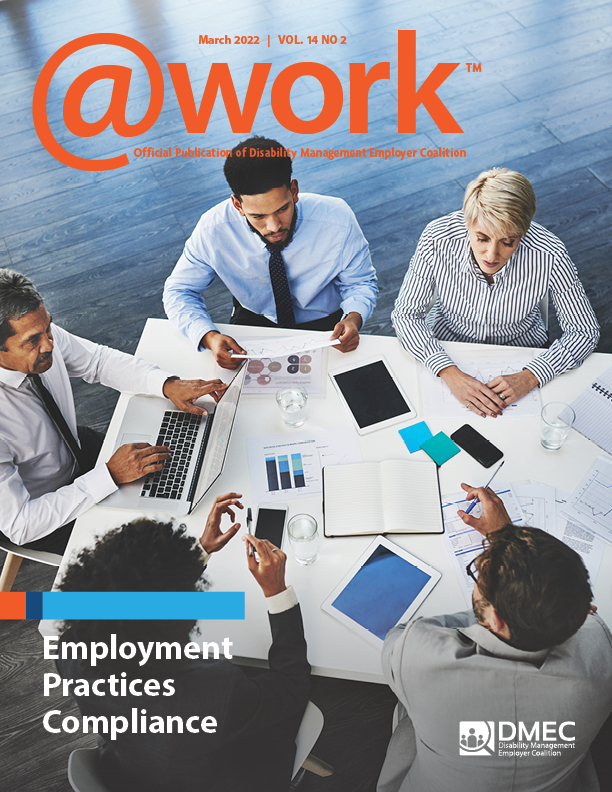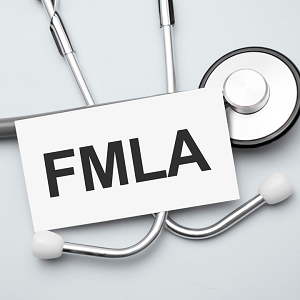
Employment Practices Compliance
March/April 2022
Facing ongoing challenges and expanding responsibilities, IAM professionals are arming themselves — and their teams — with the knowledge, skills, and resources to ensure compliance. This issue of @Work magazine includes tips and tools to support and guide professionals as they navigate long COVID, an increasing number of accommodations, and return-to-office implementation after years of anticipation.
The CEO’s Desk
The Essential Role of Education in Compliance
While statistics show improvements from previous years, it is clear we haven’t yet mastered compliance especially when it comes to granting FMLA leave and providing ADA accommodations. There continues to be a need for ongoing training, effective communication, and an evaluation of staff knowledge, skills, and comfort level with the difficult aspects of integrated absence management. Read more.

Features
Vaccines and the Workplace: Are Employers Inoculated from Liability?
As it currently stands, employers can make their own determinations about requiring vaccinations though they must abide by the general duty clause in the Occupational Safety and Health Act to provide a work environment that is “free from recognized hazards.” And whether they are required to or choose to enact a mandatory vaccination policy, some employees will seek exceptions. Read more.

Evolving Challenges of Leave Compliance
Employers are subject to a multitude of annual changes pertaining to absence and statutory disability from legislatures, the U.S. Department of Labor, state labor departments, and other regulatory agencies. Employers can protect themselves by creating a leave compliance action plan and knowing how to respond to the complexities of regulatory changes. Read more.

Spotlight Articles
Compliance Showcase
Second and Third Opinions: The Powerful but Overlooked Tool to Combat FMLA Abuse
Leave abuse can damage workplace morale while driving up costs because of lost productivity, overtime pay, or the need to hire replacement workers. Challenging a suspicious certification may rein in an employee playing loose with FMLA leaves and allow you to manage the claim effectively. More broadly, it can have a ripple effect for other requests. Read more.

Program Showcase
Creating a Rapid Response to Minimize Disruption: How Employers Balance Agility and Compliance
As we’ve learned in the last two years, employers need to be agile and flexible. They must be able to quickly implement new leaves, policies, and benefits to continue operations and remain compliant as they face pandemic-related issues and other developments that lie ahead. Read more.

Compliance Showcase
When Service Members Come Home: Military Leave Trends and Considerations
Even though USERRA has been the law for more than a quarter century, employers and employees still struggle with its nuances. What types of service are covered? How much work can an employee miss due to military service? An early 2021 amendment to USERRA further muddied the waters, as did a handful of recent court cases regarding pay during military leave. Read more.

Program Showcase
FMLA Leave Administration Tuneup: Employer Choices Worth Reviewing
It is a good practice to evaluate your federal Family and Medical Leave Act administrative choices periodically to make sure they meet your organization’s needs and goals — particularly in light of changes made to state laws and workplace norms during the last two years. Read more.

Expanded Perspectives:
@Work to Share
DMEC provides the following @Work magazine articles and podcast episodes to offer additional perspectives on and increase awareness of integrated absence management trends and challenges. The resources — available to members and nonmembers — can be shared with your colleagues and through social media channels.
2022 Trends
Have We Reached a Tipping Point? The ADA & COVID-19
Determining a “reasonable accommodation” is more complicated than ever, due to ongoing concerns about COVID-19, long COVID, and a dizzying number of state-specific requirements for COVID-19 vaccine accommodations and supplemental paid sick leave. We must brace for ongoing COVID conversations — considering millions of people are affected by long COVID which may be keeping more than one million employees out of work. Read more.

DMEC Podcast
The Secret to Success with ADA & COVID-19: Agility and Innovation
The first episode of “Absence Management Perspectives: A DMEC Podcast” offers insights into how absence management professionals have kept pace with high demand for ADA requests prompted by COVID-19. Listen in as DMEC CEO Terri Rhodes chats with industry experts about the volume of claims, coping mechanisms, and the agility and innovation that has kept professionals’ heads above water during this difficult time. Listen.
Perspective is Everything: Annual Leave Management Survey Offers Practical Insights
The 11th annual DMEC Employer Leave Management Survey white paper, published April 15, provides context for an increasingly complex industry that affects all aspects of an organization’s success. The survey has grown in size and scope since 2011 and illustrates a growing recognition that integrated absence management programs mitigate costly compliance risks. Read more.

DMEC Podcast
Trends in Employer Leave Management: 11 Years of Perspectives
In this episode of “Absence Management Perspectives: A DMEC Podcast,” Terri Rhodes, DMEC CEO, discusses findings and trends illustrated by the 11th Annual DMEC Employer Leave Management Survey with Karen English, senior vice president of Spring Consulting, an Alera Group Company. Listen.
Columns
Absence Matters
What to Expect When Your Employee is Expecting
Many companies are engaging in interactive dialogues with pregnant employees — whether or not the state requires them to do so. This approach offers multiple benefits as in almost all situations, if employers and employees find solutions that help employees stay at work, everyone wins. Read more.

Integrated Absence Management
Managing Leave in the Remote/Hybrid Workplace
With ongoing safety concerns driven by COVID-19 and a challenging employment market, it’s essential to figure out how remote and hybrid work affect workplace rules and procedures — especially when you are managing something as complex as employee leave requests. Read more.

Engaging Today’s Workforce
The Impact of Paid Leave for Caregivers in a Hybrid Workplace
The next challenge on the horizon is navigating new and existing leave laws in hybrid workplaces, where employees work from offices on some days and remotely on others. While the transition to a hybrid work environment may be challenging for many, it has been especially difficult for caregivers who balance work and caregiving responsibilities. Read more.

Employer Solutions
A Remote Possibility: Compliance Challenges to Returning to Offices
More U.S. employers are embracing hybrid work in a post-COVID-19 world to balance the ease of working from home with the benefit of face-to-face collaboration and camaraderie. To bring some or all workers back on-site, employers face legal requirements and complexities, including whether a work-from-home setup is a reasonable accommodation under the ADA. Read more.

Common Sense Compliance
Post-Pandemic Compliance Tips
This month marks the two-year anniversary of employers navigating complex COVID-19-related employment practice compliance issues including employee safety, paid and unpaid leave, and accommodations. Amid a constantly changing environment, employers must remain diligent in maintaining compliance and continuing to foster healthy and safe work environments. Read more.

Featured Case
Tips for Responding to Incomplete or Insufficient FMLA Certifications
A common challenge for employers administering Family and Medical Leave Act (FMLA) leave is dealing with incomplete (blank sections) or insufficient (vague, ambiguous, or nonresponsive) certifications. The FMLA regulations provide guidelines for addressing incomplete and insufficient certifications. Read more.

Leave Technology
Technology Considerations for Employers
When evaluating technology options, start with two nonnegotiables — compliance and data security — both of which should be considered the bare minimum for moving forward with a vendor. Once those items are assessed, consider other important criteria such as automation, analytics, and whether the technology is employee centric, scalable, and adaptable. Read more.

The Disabled Workforce
Developing Your ADA Leave Management Program in a Post-Pandemic America
While your organization may still be in survival mode dealing with COVID-related absences, it is time to start thinking about implementing a strategic leave management plan to accommodate absences and ensure success. Read more.

DMEC RESOURCES
DMEC News
This edition of DMEC news features updates on our virtual one-day compliance conference in April, the 2022 DMEC Emerging Leader Award nomination period, and a new pulse survey on workplace accommodations. Read more.

Legislative Updates
Check out the latest federal, state, and local compliance updates on DMEC Legislative Updates. Recent posts cover paid leave updates in San Francisco, Washington, D.C., and Massachusetts; new mask guidance; and more. Read more.
Be sure to follow DMEC on Twitter, Facebook, and LinkedIn for additional insight & up-to-date news.

Continue the Conversation
Share insights and ideas around the Employment Practices Compliance issue with other DMEC members in the DMECommunities Family and Medical Leave Act, Americans with Disabilities Act, and the Paid Leave groups. DMEC’s online networking groups give you the opportunity to connect with industry peers, ask/answer questions, share resources, and seek feedback. Get started.


@Work™ magazine is the official publication of the Disability Management Employer Coalition. Copyright© 2022, Disability Management Employer Coalition (DMEC). All rights reserved.
Editorial Policy
The goal of @Work is to present industry and Association news, highlight member achievements, and promote the exchange of specialized professional information. The statements and opinions expressed herein are those of the individual authors and do not necessarily represent the views of the Association, its staff, board of directors, or its editors. Likewise, the appearance of advertisers does not constitute an endorsement of products or services featured in this, past, or subsequent issues of this publication. DMEC makes no representations, warranties, or assurances as to accuracy of the information contained in the articles, and no content herein is legal or tax advice. Consult appropriate professionals for legal or tax advice.
Editorial Staff
Editor: Heather Grimshaw
Editorial Advisory Group: Linda Croushore, Rebecca Fisco, Steven Genduso, Jenny Haykin, Terri Morris, Fred Schott, Jessica Thornton, Lori Vickory






